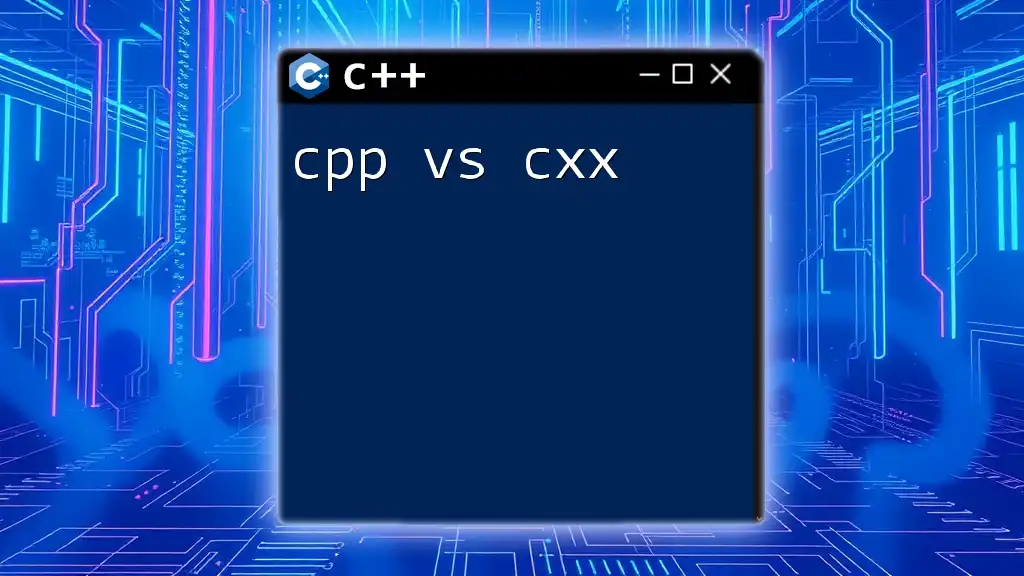In programming, "cpp" generally refers to the C++ language and its preprocessor, while "cxx" is commonly used as a file extension for C++ source files, and both serve the purpose of handling C++ code but are utilized in different contexts.
Here’s a simple C++ code snippet for illustration:
#include <iostream>
int main() {
std::cout << "Hello, World!" << std::endl;
return 0;
}
What Does CPP Stand For?
CPP stands for C++ Source File. It is a widely recognized file extension that programming professionals and enthusiasts use when working with C++ code. The use of .cpp is standard across many development environments, making it intuitive for programmers around the globe.
In C++, the rules of syntax and structure allow for object-oriented programming, making it a powerful tool for developing software applications. The .cpp extension signifies that the file contains source code for compiling into an executable program or application.
Here’s a simple example of a basic CPP file:
#include <iostream>
int main() {
std::cout << "Hello World!" << std::endl;
return 0;
}
This code snippet demonstrates the core functionality of a C++ program, from importing libraries to defining the main function and outputting text to the console.
What Does CXX Stand For?
CXX is another common file extension used for C++ source files. Like .cpp, the .cxx extension signifies that the contained code should be compiled into an executable. This naming convention is especially prevalent in certain Unix and Linux environments where CXX is often used to conform to specific project structures or standards.
Here's an example of a basic CXX file:
#include <iostream>
int main() {
std::cout << "Hello from CXX!" << std::endl;
return 0;
}
Just like in the CPP example, this code provides the essential components needed to create a C++ program.
CXX vs CPP: Key Differences
File Extensions
The primary difference between CXX and CPP is simply their file extensions. While both serve the same purpose, their usage can vary based on the environment or project requirements. In many cases, they are interchangeable; however, specific conventions may lead developers to prefer one over the other.
In terms of file organization, projects utilizing CXX files often align with programming practices borne in the Unix/Linux world, which can impact integration with various version control systems and tools.
Compilation and Linking
When it comes to compiling, both CPP and CXX files are treated similarly by most modern compilers. Here's how compilers recognize these file types:
g++ -o example example.cpp
g++ -o example2 example.cxx
In this example, both commands compile their respective files into executable programs (`example` and `example2`). This illustrates that while CXX and CPP files can be handled together in project builds, some developers might find that their naming conventions foster better readability or organization within their project’s structure.
Why Use CXX Instead of CPP?
Choosing CXX over CPP usually comes down to context and community standards. There are a few reasons why developers might prefer CXX:
-
Historical Context in Unix/Linux Systems: The CXX extension is often seen in environments that value tradition and standards that have evolved over decades. Projects oriented around these systems may have adopted CXX for consistency.
-
Compatibility with Certain Build Tools: Some build systems and scripts may have been originally designed to recognize CXX files, making them the preferred choice for developers working in those ecosystems.
-
Community Standards: Certain open-source projects may specifically request or document the usage of CXX to promote uniformity, so it's worth considering the conventions of the community you are working in.
How to Set Up Your Development Environment
Required Compilers
When working with both CPP and CXX, it is vital to choose a compiler that seamlessly supports both extensions. Most popular compilers like GCC, Clang, and MSVC can handle both without any issues. This compatibility allows you to freely choose your file extension based on your project's needs without worrying about compilation hurdles.
Sample Makefile
To illustrate how to handle both CPP and CXX files in a project, here’s a sample Makefile that shows how to compile them together:
CXX = g++
CXXFLAGS = -Wall -Wextra
TARGET = my_app
SOURCES = main.cpp utils.cxx
all: $(TARGET)
$(TARGET): $(SOURCES)
$(CXX) $(CXXFLAGS) -o $@ $^
clean:
rm -f $(TARGET)
In this Makefile:
- CXX specifies the compiler.
- CXXFLAGS sets compiler options, optimizing warnings for better code quality.
- TARGET denotes the final executable name.
- SOURCES list both CPP and CXX files that need to be compiled.
This well-structured Makefile provides clarity to the build process, fostering an efficient workflow whether you are using CPP or CXX files.
Conclusion
In summary, understanding the distinction between CPP and CXX files is crucial for developers working within varying programming environments. Both serve their purpose, and choosing one over the other can depend on community standards, file organization, or personal preference.
Consider experimenting with both CXX and CPP in your projects to develop a deeper understanding of how file types can affect your programming workflow. Each file extension approaches the same language with subtle nuances and traditions, contributing to the rich tapestry of software development.
Call to Action
Have you encountered scenarios where CXX or CPP made a notable difference in your projects? Share your experiences with us! Additionally, if you want to dive deeper into C++ commands and enhance your programming skills efficiently, consider enrolling in our courses for a quick and concise learning experience.








